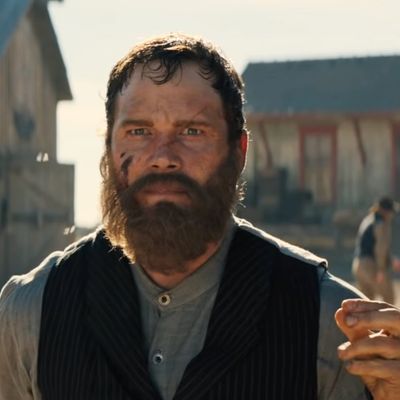
Unromanticized portraits of the Old West are nothing new these days — if anything, they’ve become their own cliché — but even so, the opening moments of The Kid suggest a whole new level of grit and savagery. Two kids watch in horror while their father viciously beats his wife. Then, a shot rings out, and we see that the boy has blown his father away, but not in time to save their mother. It gets worse: Soon, their psycho uncle (played by an unrecognizably scruffy Chris Pratt) shows up and, in a fit of spittle-flecked rage, starts beating the woman’s corpse. Needless to say, the kids — 15-year-old Rio (Jake Schur) and his older sister Sara (Leila George) — get the hell out of there, fleeing on horseback for as far as they can go.
But the violence is never far. Even as they worry that their murderous uncle might find them, Rio and Sara find themselves holed up with William Bonney, a.k.a. Billy the Kid (Dane DeHaan) and his gang of outlaws, themselves fleeing from a posse of men led by Pat Garrett (Ethan Hawke). Rio knows the story of Billy the Kid, and there’s an immediate connection between them, founded on their ghastly pasts. “I was 13. It happened to me,” Billy says to the boy, without having to hear any details of what actually happened. Then he gives the child a small stone. “This rock found me like you did.” All these moments, occurring so close to one another, give a sense of the contradictions The Kid attempts to work. It’s an old-fashioned boy’s own adventure — the kind of dime-store fantasy upon which the myth of the West was originally built — refashioned as a grotesque nightmare.
That’s a compelling structuring device, and that opening, primal scene of domestic violence spreads like a poison across the psyches of The Kid’s characters. But there’s something missing here, still — a dimensionality that will allow us to see these people as human rather than archetypes. DeHaan gives a spirited performance as Billy; he manages to convey confidence and charm beneath the ruthlessness, but he still feels like he’s playing a legend instead of a person. Hawke, always solid, gives lawman Garrett a melancholy stoicism that might work on paper, but fails to convey much of an inner life. As Rio, Schur does little more than look out wide-eyed and terrified at the world; he’s more guide than protagonist, it seems. And for a story that is partly about the violence and hatred faced by women in the Old West, the female characters are given relatively little to do, being mostly left to suffer in the background. The one surprising performance here is Pratt, who is alarmingly convincing as a screaming, relentless, over-the-top lunatic.
Directed by actor Vincent D’Onofrio, The Kid often suffers from a weirdly rushed quality. An early scene in which Garrett’s men converge on a shack being used by Billy and his gang is intercut so shoddily that you’re liable to think there’s something wrong with the projection. But the film also manages passages of startling, grim beauty. At one point, Rio witnesses the hanging of one of Billy’s gang, in front of a wild, shrieking crowd. The boy finds himself hiding right by the gallows pit, so that he’s staring straight at the convict as the trap door opens and the man plummets to his death. We see the top part of the dying man’s face, as the life quickly goes out of his eyes. It’s a brutal, heartbreaking moment, and the movie gives it to us straight on, in close-up, practically rubbing our faces in it. That sort of encapsulates what The Kid wants to accomplish in general. It succeeds sporadically as a corrective anti-myth, but as a story about people, it fails to come to life.


